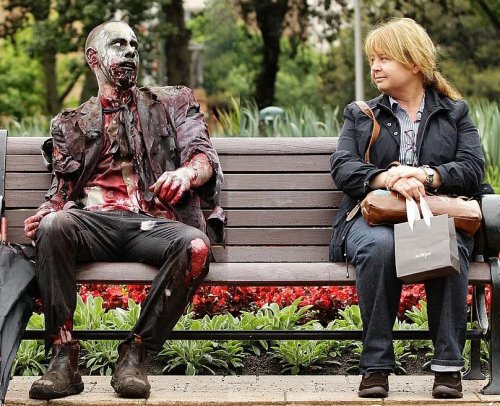
Zombies are a completely fantastical phenomenon (one hopes). But at the same time, they're so frequently mentioned that they make you think. We persistently place these characters in films, comics, and computer games. We incorporate them into religious cults, masquerades, and even modern philosophy (the most inquisitive might even search for the “zombie argument”).
Why such persistence? After all, the image of a zombie is a creation of our minds. So what compels us to invent such exotic characters?
Zombies are the pinnacle of perseverance
Yesterday, he was an ordinary, successful guy. A lawyer, a customs broker, a bank clerk, or a marketer. But, unfortunately, he fell into the hands of sophisticated criminals. The investigation will determine what influenced him—hypnosis, psychotropic substances, or special radiation. But the result is obvious—a program was implanted in the victim's brain. Now this man has become the embodiment of the desire to complete a task. No matter what happens around him, he will continue to move forward, and at first, those around him won't even notice any changes.
Such introductions allow for a cleverly twisted plot. But the most interesting moment usually remains “off-screen.” It's completely unclear what this zombie will feel if it succeeds in achieving what it was created to do. This usually doesn't happen, as it contradicts the concept of a mandatory happy ending. But let's stretch our imaginations and try to imagine it. The goal is achieved. What next? Zombies have no new horizons, nor can they have them.
Are such plot twists a deliberate “letter” from our subconscious, asking us to pay more attention to real life? Career, money, and success are all well and good. But by pursuing them too stubbornly, we can confuse the means and the ends. And, having achieved what we desire, we ultimately fail to understand why we lived our lives. Isn't it sometimes worthwhile to take a break for the sake of loved ones or simply for games and entertainment?
Zombie is a champion of stability
The Dark Continent is rich in cults and beliefs unfamiliar to us. In some regions, residents are convinced that approximately half of those around them are dead. The dead walk the streets, dance at parties, drink banana beer on weekends, and work during the week. They returned from the world of the dead not by the will of evil voodoo sorcerers (that's a whole other tale), but of their own accord. They simply didn't like the afterlife, didn't understand it, got scared or bored, and wanted to go back.
And the poor souls have little to do among the living. The “returnees” stink, sometimes an eye might pop out of its socket, or the skin on their nose might suddenly turn green (a typical African solution is to tint the affected area with charcoal). But the earthly world is so familiar that traveling “beyond” to the blessed valleys of their noble ancestors is simply not an option. It's terribly uncomfortable to change anything in your life, even though it's clearly long overdue.
This image is a clear response to the age-old fear of taking a decisive step. The moral of the African fable is clear: those who don't move forward rot, those who don't want to change anything are already dead. A good way to test your brain's flexibility is to master a new game reality.
Zombie is a hero
They are the perfect soldiers. They feel no pain, fear, or regret, and know no doubt. They are ready to lay down their lives for their masters. They come and kill. Efficiently and methodically. There is also a more “anarchic” version. A breed of zombie that simply smashes and destroys everything around them without any clear goal. This is probably the most common subspecies of the “living dead.”
However, the puzzle posed by our subconscious in this case isn't as easy to solve as it might initially seem. It's not just a matter of simple humanistic conclusions (something like the idea that you'd have to be a completely insane and extremely unsympathetic idiot to destroy a neighbor “for an idea”). Looking at the problem more broadly, such a zombie is the inflexibility of our consciousness.
We often fight for our beliefs simply because they're ours. Over time, losing the ability to critically examine the world around us and ourselves, we prefer to rely on ready-made mental “clichés.” This turns us into zombies who are not only incapable of understanding a living, changing reality but also aggressive toward it. After all, if something doesn't align with our notions of what's right, the simplest solution is to condemn and destroy the source of confusion.
Don't want to become a zombie? You can release pent-up aggression through virtual games, and fortunately, interesting options are easy to find online.





